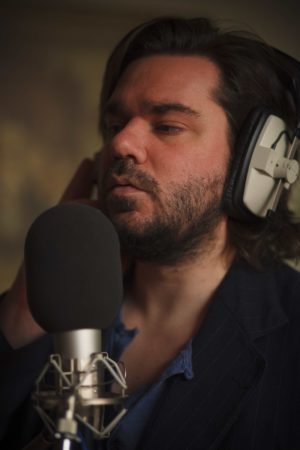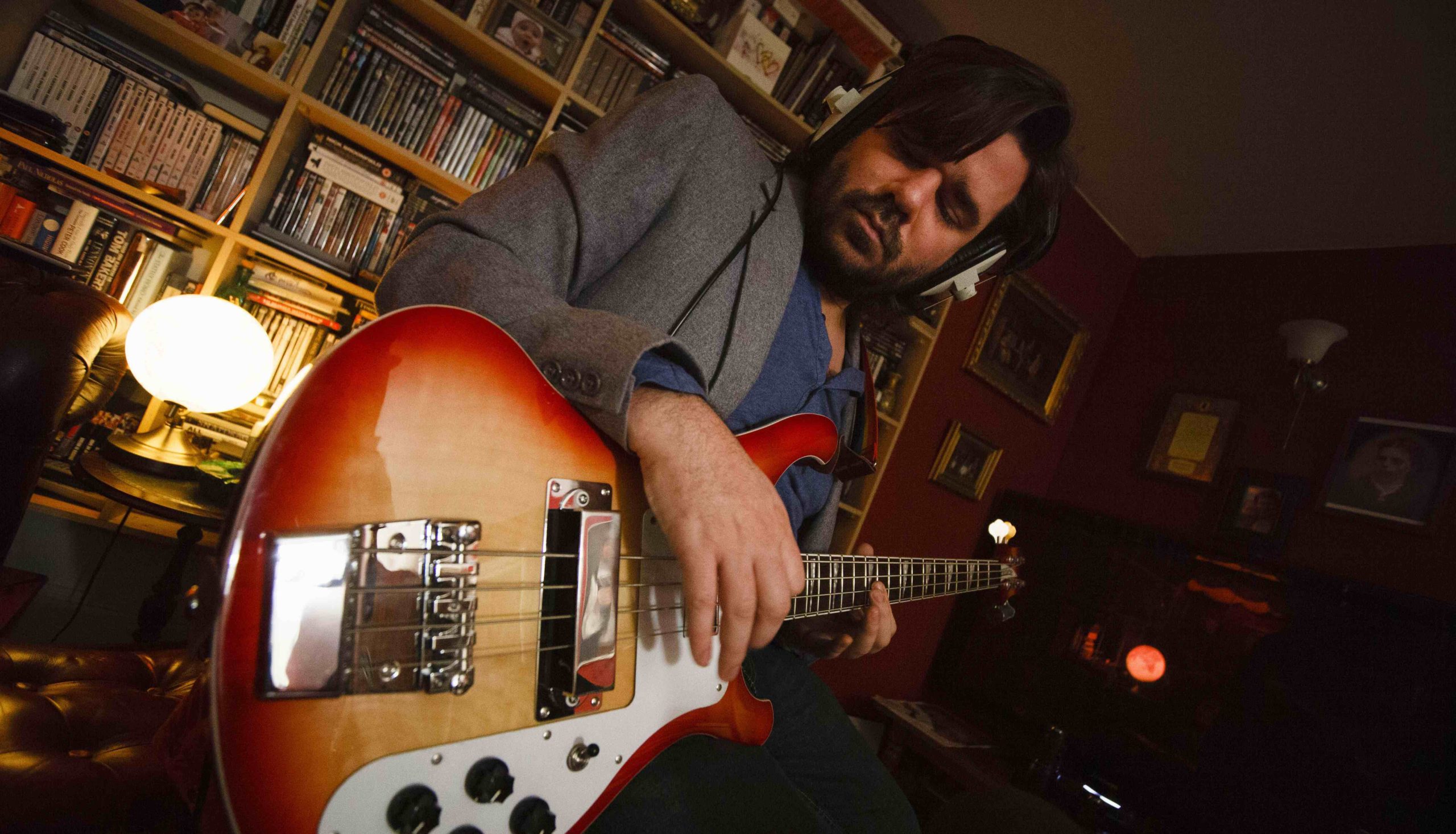As far as British comics go in the post-Python era, Matt Berry is preeminent. Along with having forged laugh-out-loud elements of British series such as Snuff Box and Toast of London, Berry has been a beloved part of both The Mighty Boosh and The IT Crowd, and continues to act in the ragingly successful TV adaptation of What We Do in the Shadows. A cheerful absurdity is the blood that runs through Berry’s veins in all of his television work, an off-the-mark confidence played against an askew set of realities.
Yet it’s as a recording musician, composer, producer, and singer that Berry’s off-beat aesthetics and confidence truly explode. Along with having written and played the theme music for Snuff Box and Toast of London, Berry has been making albums of psychedelic, soulful pop and vintage synth-driven rock—and playing all or most of their instruments—since 1995’s Jackpot, with detours such as 2011’s Witchazel and 2020’s Phantom Birds touching on Great British gothic folk and its threadbare American cousin.
The Blue Elephant, however, is his newest masterpiece—a Moog/Mellotron-strewn pop effort crammed with dozens of airy-open vocals (all Berry’s), contagious-yet-subtle hooks, and camouflaged lyrics touching on all of 2020’s most isolationist themes. Berry phoned me from his home in London to ride the wild Elephant.
Between the Dylan-esque lyrical imagery on one hand, and British rock’s earliest use of Moogs and Mellotrons on the other, I’d say your music is stuck right around 1968-69 when it comes to inspiration. What’s so pleasurable about that period that makes you want to relive it in these recordings?
Well, you’re not inaccurate. What I appreciate most about records that were made then is that in terms of the technology, what you could do in a studio peaks at about 1973. There was a warmth to the sounds. After that period, we became too reliant on shortcuts. The last few albums had that last great era as a flavor.
I know that you’re playing all but one instrument on Blue Elephant. Like the album before that, was it recorded at home? And is it fair to say that the isolation of the pandemic worked for you and your music?
Yes, it was recorded at home. And yes, I guess it did work for them in that I wouldn’t have had nearly as much time to finesse its music and sound had there not been a lockdown. I got a bit more time to concentrate. Due to the quranatine, me going to Canada to shoot the vampire show was postponed until the beginning of the next year. That gave me the autumn and the beginning of winter just to work on my stuff, write, record, mix, and master.
Do you feel as if such isolation heightened your lyric writing, allowed you to focus on the issues run rampant in 2020?
Unlike everybody else who got to bounce their ideas off each other, I’m not on social media. When I’m on my own, there isn’t anyone for me to talk to. I don’t jump on my phone and talk on Twitter or whatever. So the echo of your own thoughts are amplified when you’re on your own.
“I never want to say exactly what a song is about. Once I record it, it’s for everyone—not my property.”
Why are you not on social media?
Because I haven’t seen any good sides to it. I haven’t witnessed many people made happy by it. It’s just not of any interest, really. That’s probably the main reason. I’m interested in other things, and those other things take up a lot of time.
Whether it’s “Summer Sun,” and the idea of speaking truth to lies, or “I Can’t Speak,” which seems to focus on talking without censure—
Well, I never want to say exactly what a song is about. Once I record it, it’s for everyone—not my property.
Fair enough. As someone who writes regularly beyond music, do you feel free of censure in a time such as the present?
I think any artist on any platform must contend with the fact that the world’s a different place. I don’t have anything holding me back when I do music. I do whatever I want. Certainly, my record label is very good and never tells me what to do.
Can you describe the separation, if there is one, within your creative processes, be it the lure to write music or the desire to write dramatically, something scripted? Are the impulses so different?
What usually happens depends on my circumstances. Unlike music, where if I have an idea I can start on it immediately if I’m home, a script always takes time to get up and running. Maybe they’re the same—I mean, either way, I write it down. Record the notes. I also finish music-writing projects faster than I would any script.

Listening to the breadth of your work, do you feel as if you may just be a musician who happens to act?
I don’t think of myself. I just feel lucky to do both and to be able to get paid doing both.
Can you identify the signatures, from Jackpot to Blue Elephant that carry through your records—other than your love for a good Mellotron?
I suppose the utter Britishness of it all. That’s the greatest throughline.
Can you tell me, then, the influences within that Britishness that have carried on through to the present?
I can remember hearing Mike Oldfield’s Tubular Bells in my formative years. It was an important album because it sounded like chaos. It sounded like illness. If I didn’t know what mental illness was then—I couldn’t have vocalized it—Tubular Bells was what I imagined it sounded like. It was unsettling. It sounded as if it went against everything that was on the radio. There wasn’t a frontman, or catchy lyrics. And I was attracted to all that. It wasn’t pop. It went in the face of absolutely everything—that stayed with me forever.
You’re talking about Oldfield, whose music was easily frightening, and you mentioned folk earlier—where do you stand on Fairport Convention, whose atmospheric music certainly had an element, or an ambience, of fear to it all?
English folk’s elements are interesting. They bring with it a load of atmosphere. I’m also very interested in the countryside and British folklore, all of that. The terror of the countryside—I think that’s been a part of my music from the start. Most obviously on Witchhazel. I said all that I wanted to say about “folk horror” with that album. But that vibe, that unsettling, is something that I have always been interested in. It’s almost like another texture.
Do you know why that fear is there in the first place?
It goes back to the television of my youth, I think, and living in the country. Being afraid of scarecrows was a very big thing for me growing up. Kids TV in the 1970s and 1980s in the UK was quite frightening stuff, too. That probably had some effect—a good effect, actually.
Speaking of texture, you have a tendency to mask your vocals in heavy echo, then mix it down so that its volume is equitable to your instrumentation. You have a pretty dynamic voice, but you pull it back, and turn it into a texture. Why?
“I’m also very interested in the countryside and British folklore, all of that. The terror of the countryside—I think that’s been a part of my music from the start.”
In terms of the music that I’m making, [my voice] really is just another instrument. I don’t feel as if it’s any more important than any of the other instruments that I record. It serves a sonic purpose. If I want to sound like 12 people in a village hall, then I do that. There isn’t a main voice, but rather a group of voices. I’ve always enjoyed that. That’s just an overall effect that I’m most interested in. “Summer’s Sky” is another example of that—a group of lead vocals within the mix. They’re leads, but they’re not pushing through the top. They’re in the mix, filling their place with everything else going on sonically.
I want to jump back to one song of yours, “Rain Came Down.” How did you get Paul McCartney to do what he did on that track, that warbly spooky askew vocal? It’s so eerie and so elegant at the same time.
It’s good that you saw that because that’s what I was going for—I wanted “eerie.” I wanted his world to merge with mine.
When you think of a “wall of sound,” the likes of which you make, the mind’s ear goes to Phil Spector, yet the density and the airiness of MGMT or My Bloody Valentine also peeks through. What kind of self-producer are you? Are you turning the room into another instrument and texture?
The room is very definitely another instrument. With Witchhazel, for example, I wanted this whole “village hall” sound. So I just found an old hall and recorded it very simply, just reel-to-reel tape machines, that sort of thing. The atmosphere that you get in the end is everything: foreground, middleground, and background. Then again, if the album has the atmosphere that exists in your head, you’re 90 percent there. How foreground am I within all that is crucial. I want to be the middleground. That’s good for me, face-to-face with the guitar—as if I’m in a field with everyone. FL









